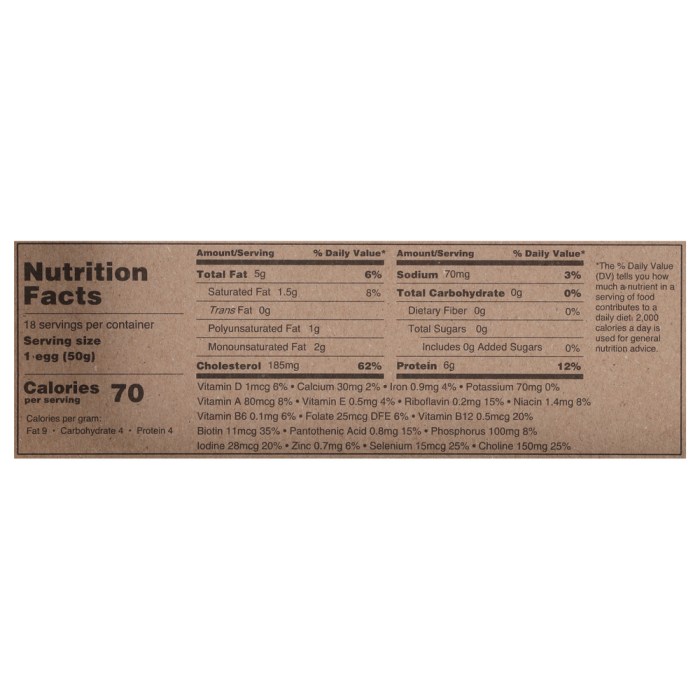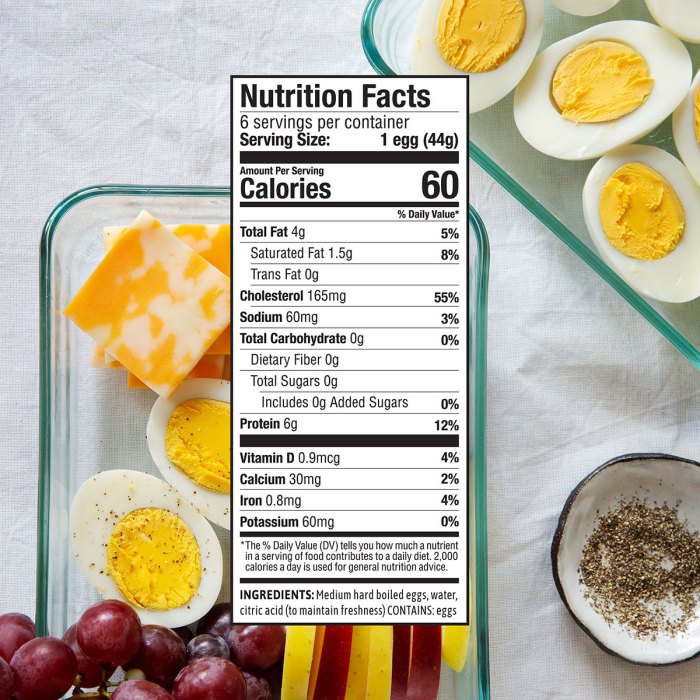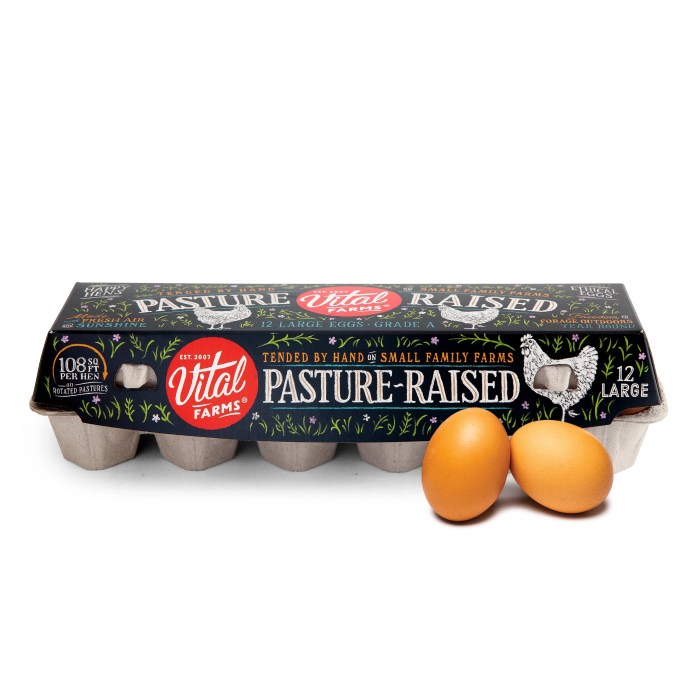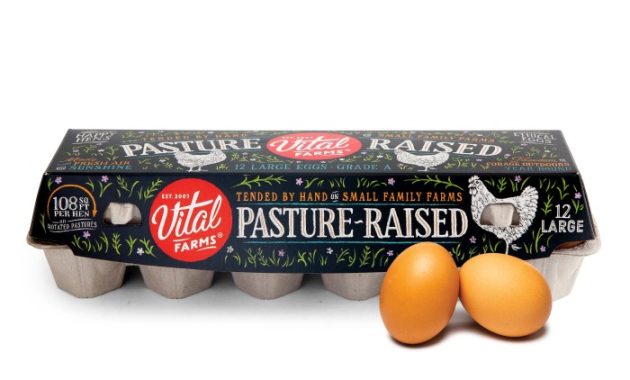Comparison to Conventional Eggs

Vital farms eggs nutrition facts – Vital Farms eggs, sourced from hens raised on pasture, often boast a nutritional profile distinct from conventionally produced eggs. Understanding these differences is crucial for consumers making informed choices about their diet and health. This comparison highlights key nutritional variations and their potential impact.
| Nutrient | Vital Farms Eggs (per large egg, approximate values) | Conventional Eggs (per large egg, approximate values) | Difference & Significance |
|---|---|---|---|
| Omega-3 Fatty Acids | Higher levels of ALA (alpha-linolenic acid) | Lower levels of ALA | Vital Farms eggs contain significantly more ALA, an essential omega-3 fatty acid linked to reduced risk of heart disease and improved brain function. This difference stems from the hens’ diet, which includes pasture grasses rich in ALA. |
| Vitamin E | Generally higher | Lower | The increased Vitamin E content in Vital Farms eggs is likely due to the hens’ access to pasture and diverse foraging opportunities, providing a richer source of this antioxidant vitamin. Vitamin E protects cells from damage caused by free radicals. |
| Vitamin A | Can be higher, depending on hen’s diet | Levels vary | While not consistently higher, Vital Farms eggs may contain more Vitamin A due to the hens’ access to beta-carotene-rich plants on pasture. Vitamin A is crucial for vision, immune function, and cell growth. |
| Cholesterol | Similar levels | Similar levels | Cholesterol content is relatively consistent between both types of eggs, although dietary cholesterol’s impact on blood cholesterol is less significant than previously believed. |
Omega-3 Fatty Acid Content Differences, Vital farms eggs nutrition facts
The enhanced omega-3 fatty acid profile in Vital Farms eggs is a key differentiator. Pasture-raised hens consume a diet naturally richer in omega-3s compared to conventionally raised hens fed primarily grain-based diets. This results in eggs with a higher concentration of ALA, offering potential cardiovascular and neurological benefits. Studies have linked increased ALA intake to a decreased risk of heart disease and improved cognitive function.
Variations in Vitamin and Mineral Levels
Beyond omega-3s, variations in vitamins like Vitamin E and potentially Vitamin A exist. These differences are primarily attributed to the hens’ access to diverse foraging on pasture, providing a wider range of nutrients compared to a restricted grain diet. These vitamins play critical roles in antioxidant defense, immune function, and overall health. The exact differences can vary depending on factors such as the specific pasture, season, and hen breed.
Potential Health Impacts of Nutritional Differences
The increased omega-3s and potentially higher levels of certain vitamins in Vital Farms eggs contribute to a more nutrient-dense food source. The higher ALA content may support cardiovascular health and brain function, while the increased antioxidant vitamins can contribute to a stronger immune system and protection against cellular damage. However, it’s crucial to remember that these differences are often subtle and should be considered within the context of a balanced diet.
Individual nutritional needs vary, and consulting a healthcare professional or registered dietitian is advisable for personalized dietary advice.
Impact of Hen Diet on Egg Nutrition

The nutritional profile of Vital Farms eggs is significantly influenced by the hens’ diet and their access to pasture. Unlike conventionally raised hens often confined to cages and fed primarily with commercially produced feed, Vital Farms hens enjoy a diet rich in natural ingredients and the benefits of foraging outdoors. This directly impacts the nutritional content of the eggs they produce, resulting in a superior product.Vital Farms hens consume a diet primarily composed of high-quality grains, supplemented by a variety of insects, seeds, and vegetation found on their pasture.
So, we’re looking at Vital Farms eggs, right? Their nutritional profile is pretty solid, boasting a good source of protein and choline. But let’s say you’re craving something sweet – a quick look at the jonny pops strawberry chocolate nutrition facts might be interesting for comparison. Then, back to those Vital Farms eggs – remember, they’re a great base for a healthy breakfast, even if you indulge in a Jonny Pops later!
This diverse diet, far richer than typical commercial feed, contributes to a more nutrient-dense egg. The hens’ foraging behavior allows them to access a wider spectrum of nutrients not found in manufactured feed, enriching the overall nutritional composition of the eggs. This natural foraging contributes to a higher concentration of beneficial nutrients compared to eggs from conventionally raised hens.
Omega-3 Fatty Acid Concentration
The pasture-based diet plays a crucial role in increasing the concentration of omega-3 fatty acids in Vital Farms eggs. The hens’ consumption of insects, seeds, and certain plants naturally rich in omega-3s directly translates to a higher level of these essential fatty acids in the eggs. These omega-3s, particularly ALA (alpha-linolenic acid), are vital for human health, contributing to cardiovascular health and reducing the risk of chronic diseases.
Studies have shown a significant difference in omega-3 content between pasture-raised and conventionally raised eggs, with pasture-raised eggs exhibiting considerably higher levels. For instance, a study published in the Journal of Agricultural and Food Chemistry demonstrated a marked increase in omega-3 fatty acids in eggs from hens with access to pasture compared to those fed solely commercial feed.
Effect of Outdoor Access on Egg Nutrition
Access to outdoor space significantly impacts the nutritional composition of Vital Farms eggs. The hens’ foraging behavior, facilitated by their access to pasture, allows them to consume a wider range of natural foods, leading to a more diverse and nutrient-rich egg. Sunlight exposure also contributes to increased vitamin D levels in the eggs. The varied diet and environmental enrichment contribute to improved egg quality and nutritional value, enhancing the overall health benefits for consumers.
The natural environment promotes a healthier hen, which in turn produces healthier eggs.
Hen Diet and Overall Egg Quality
The hen’s diet profoundly influences the overall quality and nutritional value of the eggs. A diet rich in natural ingredients, including diverse plants and insects, contributes to eggs with a richer flavor, denser yolk, and a higher concentration of essential vitamins and minerals. The absence of artificial hormones and antibiotics in the hens’ diet also ensures the integrity and purity of the eggs.
Furthermore, the stress levels of pasture-raised hens are generally lower than those of conventionally raised hens, contributing to better egg quality and improved nutritional value. The holistic approach to hen care at Vital Farms directly translates into superior egg quality and enhanced nutritional benefits for consumers.
Health Benefits and Considerations

Vital Farms eggs, sourced from hens raised on pasture, offer a nutritional profile distinct from conventionally produced eggs. This difference stems from the hens’ diet and lifestyle, impacting the eggs’ nutrient content and overall health benefits. Understanding these benefits and potential considerations is crucial for making informed dietary choices.
The superior nutritional profile of Vital Farms eggs is largely attributed to the hens’ access to pasture. This allows them to consume a diet richer in omega-3 fatty acids, antioxidants, and vitamins compared to hens confined to cages. These dietary differences translate to eggs with higher levels of beneficial nutrients and potentially lower levels of less desirable components.
Nutritional Advantages of Vital Farms Eggs
Compared to conventional eggs, Vital Farms eggs boast a higher concentration of certain vitamins and nutrients. These differences contribute to several potential health benefits.
- Higher Omega-3 Fatty Acids: Pasture-raised hens produce eggs with a significantly higher concentration of omega-3 fatty acids, particularly ALA (alpha-linolenic acid). These essential fatty acids are vital for brain health, reducing inflammation, and supporting cardiovascular health. Studies show a correlation between higher omega-3 intake and a decreased risk of heart disease.
- Increased Vitamin A and E: The hens’ access to diverse vegetation translates to eggs richer in vitamins A and E, both potent antioxidants that protect cells from damage caused by free radicals. Vitamin A is crucial for vision and immune function, while vitamin E supports skin health and protects against cellular aging.
- Enhanced Vitamin D: While the exact amount varies based on sunlight exposure, pasture-raised hens generally produce eggs with higher vitamin D levels than conventionally raised hens. Vitamin D plays a crucial role in calcium absorption, bone health, and immune function.
Potential Health Considerations
While generally considered a healthy food, some considerations should be kept in mind when consuming Vital Farms eggs, or any eggs for that matter.
- Cholesterol Content: Vital Farms eggs, like all eggs, contain cholesterol. Individuals with high cholesterol should monitor their intake and consult with a healthcare professional to determine appropriate consumption levels. However, recent research suggests that dietary cholesterol may not have as significant an impact on blood cholesterol levels as previously thought.
- Allergen Concerns: Egg allergies are relatively common. Individuals with egg allergies should avoid consuming Vital Farms eggs or any egg products. Always read food labels carefully and be aware of potential cross-contamination.
- Salmonella Risk: Although rare, there’s always a potential risk of salmonella contamination with any eggs. Proper handling and cooking are crucial to minimize this risk. Eggs should be cooked thoroughly until the yolk and white are firm.
Infographic: Vital Farms vs. Conventional Eggs
Imagine a simple bar graph. Two bars are side-by-side, one labeled “Vital Farms Eggs” and the other “Conventional Eggs.” Each bar is segmented to represent different nutrients. The “Vital Farms Eggs” bar would show significantly taller segments for Omega-3 Fatty Acids, Vitamin A, Vitamin E, and Vitamin D, visually demonstrating the higher concentration of these nutrients compared to the “Conventional Eggs” bar.
Below the graph, a short caption would read: “Vital Farms Eggs: A richer source of essential nutrients for enhanced health.”
Serving Suggestions for Vital Farms Eggs
Vital Farms eggs are incredibly versatile and can be incorporated into various dishes to create healthy and delicious meals. Here are some serving suggestions:
- Breakfast: Scrambled, fried, poached, or in omelets. Add spinach, mushrooms, or other vegetables for a nutritious start to the day.
- Lunch: Deviled eggs, egg salad sandwiches, or added to salads for extra protein and nutrients.
- Dinner: Used in frittatas, quiches, or as a binding agent in meatballs or meatloaf.
- Baking: Incorporated into cakes, muffins, or cookies for added richness and flavor.
Query Resolution: Vital Farms Eggs Nutrition Facts
Are Vital Farms eggs organic?
Not all Vital Farms eggs are certified organic, although their hens are pasture-raised. Check the packaging for specific certifications.
How long can I store Vital Farms eggs?
Store Vital Farms eggs in the refrigerator for up to 4-5 weeks for optimal freshness.
Do Vital Farms eggs contain any antibiotics or hormones?
Vital Farms eggs are produced without antibiotics or added hormones.
Are Vital Farms eggs suitable for people with egg allergies?
No, individuals with egg allergies should avoid consuming Vital Farms eggs, as they still contain egg proteins.

